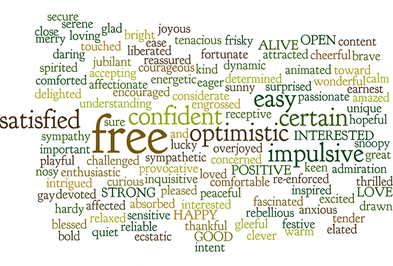 Flavius dies, tossing handfuls of shredded paper across the stage like blood spewing from a severed artery. The shards scatter slowly in the silence. Brutus and his fellows conspire to kill Caesar, their friend and leader. As they discuss their bloody deed, they each grab a section of the script itself and twist it in their hands; each crumpled piece molding itself into a personalized blade, the pen and the sword together as one. The conspirators surround the great Caesar, paper daggers held behind their backs. Quick as snakes, they stab him, rending his body literally with his own words. That was it, watching an adaptation of Julius Caesar, the moment I knew what my next book had to be about, the power of life directly correlated to story, to words on the page. I spent the rest of the day running the scenarios in my head until a new plot solidified and began playing itself out every time I closed my eyes. Just like my tagline states, words have power, they grow and change; they are living. But how important is story, anyway? Do words hold any tangible power over us, or are they only as influential as the latest hashtag? When I was very young, I slept in bed beside my great grandma Ruby. She was already gravely old then, with wispy white hair and shriveled legs that could barely hold up her frail body. I remember vaguely the oxygen tube always draped over her ears and that she loved a bowl of bread and milk (which I have tried and cannot recommend). My fonder memories are of her stories. I asked, nearly every night, for a new story as we lay in bed. Grandma Ruby would think for a while as I attempted to wait patiently. Finally, she would breathe deeply and begin: Jonny and Jimmy were tired of playing inside all day, so they begged their mother to let them go play outside by the pond. “Yes,” she said, “but be careful.” “We will,” and off they would trot, with old tom cat following closely behind them... Jonny and Jimmy played out a new scenario almost every night. I can’t even remember ever hearing the same story more than once, but I loved hearing them no matter how long I had to wait. Those nights of childhood fancy cemented in my heart a love for story that has only strengthened with the years. Oral traditions predate any extensive writing by millennia. Any major events or learning in ancient history had to be passed down verbally between the generations. Modern language experts have studied societies with oral traditions extensively to understand just how such long form memorization can take place accurately. What they found were repetitive mnemonic devices and typical scenes that could be played out over and over again with the recorded information. Basically, they realized what ancient people already knew, our brains are hard-wired to remember specific story structures, so repeating those structures in formulaic ways allowed for long form memorization. Think epics like the Iliad and the Odyssey which were each hundreds of lines in length but were passed down to impart history, folklore, and tradition. Even the Bible has oral tradition attached to it with some scholars attributing a musical rhythm to dots on the original Hebrew versions of the text. Even Jesus taught in parables because we seem to remember stories over almost anything else. Fast forward to today and consider for a moment the practical applications of words. We sign contracts and consider them binding by law because the right words have been used; in fact, for much of history a handshake was the binding seal over oral contracts between two parties. Two words obligate you in marriage; your signature proclaims your approval; prayers reach through space to connect you directly with God; words make or break friendships faster than I can sniff out a pizza coming through the door; a buzz from your phone lets you know there are words to experience and you must do so right now; and one slip up on your fast food order gets you the small instead of the much needed large. It's all a word-spiracy, man! In his TED talk, “Why a good book is a secret door,” Mac Barnett discusses the power of a story to break the divider between fiction and reality. He wants a book to be a secret door that opens and allows the fiction to populate the real world, and, in a way, it often does. Harry Potter fans can visit Universal studios and buy wands and robes in Harry Potter world. That same fan can then go online and find out what Hogwarts house they are in, what their Patronus would be, and even what wand they would have. The story of Harry Potter has affected us so deeply that we long to experience the magical world in J.K. Rowling's books. When we connect with a story, we imbue parts of it into our self until we are making costumes for just a moment of true connection with the story we loved. From birth, we hear what others are saying, repeatedly, until we begin to understand those noises ourselves. As we develop, our rational thought is literally made up of the language we are hearing around us. Think about that. Your thoughts are literally the symbols of your native language. Words are your thoughts; they are everything with which you identify as a rational thinking, being. More words mean more thoughts, fewer words… well, you get the idea. Let’s end at the beginning. When teaching Shakespeare, I know that my students will understand the play so much easier if we watch it being performed instead of just reading the static written words. An actor’s inflection and movements add volumes of meaning to what is being said, just as the author intended. Layer on top of that the fact that Shakespeare introduced more than 1,700 new words and phrases to the English language that are still in use over 400 years later, and you will see the staying power of a good story. So, do words really have any power? You tell me. Thanks for reading! How have you experienced the power of story? Leave a comment and let me know. Zach Larson Author at Living Words Press Have a question you want to ask? Leave a comment below or email me at [email protected]. I want to know what type of post you would like to see from me next. P.S. Want more content right now? Sign up for my newsletter to receive bonus material, reviews and recommendations, pre-release goodies, and free stuff. Sign up now on the home page: Livingwordspress.com. Just click the button under the title. You don't have to purchase anything to sign up for the newsletter. Most of the content included in the newsletter is exclusive to subscribers, so don't miss out! Follow me at: @livingwordsp www.facebook.com/livingwordspress Sources: https://www.britannica.com/topic/oral-tradition https://www.ted.com/talks/mac_barnett_why_a_good_book_is_a_secret_door Extra Source: https://www.youtube.com/watch?v=muuWRKYi09s
0 Comments
|
Details
AuthorI see how words surround us every day. Life is a construct and words the vehicles of understanding. Archives
December 2023
Categories |

 RSS Feed
RSS Feed
